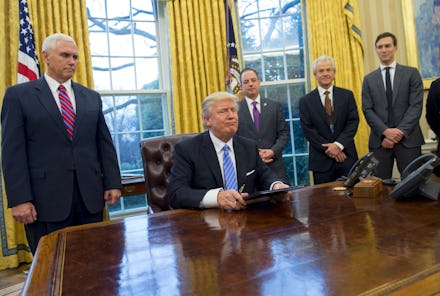Trans-Pacific Partnership: What pulling out could mean for the US in the long-term

President Donald Trump signed an executive order Monday to withdraw from the Trans-Pacific Partnership, the 12-nation trade deal struck by the Obama administration that Trump has previously described as a "rape of our country."
The TPP, which has been a political lightning rod for both conservatives and progressives, would liberalize trade relations by lowering import and export taxes and establishing common rules among a dozen countries: the United States, Australia, Canada, Japan, Malaysia, Mexico, Peru, Vietnam, Chile, Brunei, Singapore and New Zealand.
The Obama administration argued the deal would "promote economic growth; support the creation and retention of jobs; enhance innovation, productivity and competitiveness; raise living standards; reduce poverty in our countries; and promote transparency, good governance, and enhanced labor and environmental protections."
But opponents countered it could kill jobs for less-educated Americans and favor foreign competitors over U.S. manufacturers, and the deal never passed through Congress.
What does pulling out of TPP mean?
Because the TPP was never approved by Congress, Trump's move Monday does not change current U.S. trade policy. But it does seem to doom the ambitious trade agreement that former President Barack Obama had hoped to make part of his foreign policy legacy; the deal hinged on both the U.S. and Japan signing on by a February 2018 deadline.
The deal had been part of the Obama administration's "pivot" to Asia – an attempt to bolster allies in the region and serve as a counterweight to China, which was not included in the trade agreement. Formally withdrawing from the deal, then, may embolden China and lessen American influence in the region.
But Trump had made killing the TPP central to his presidential campaign, even leading Republicans and Democrats, including Hillary Clinton, who had previously supported the deal to backtrack. His executive order made good on one of his campaign promises, and signaled that he intends to follow through on the protectionism and isolationism of his "America first" inauguration speech.